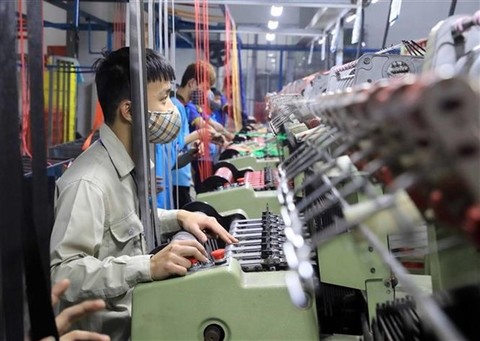
Workers during a shift at a packaging factory in the northern province of Hưng Yên. — VNA/VNS Photo
Việt Nam has been overly reliant on FDI businesses and the country should start developing a comprehensive industrial ecosystem to support the development of domestic industries, said industry leaders and policymakers.
According to a report by the Ministry of Industry and Trade (MoIT), the industrial sector currently accounts for over 90 per cent of Việt Nam’s total exports, 25.8 per cent of the country’s jobs with an additional 300,000 jobs being created annually. In recent years, the Southeast Asian country’s industrial sector has gradually shifted away from resource-intensive, low-tech towards high-tech, high-value industries.
Investment in industrial development has continued expanding, accounting for nearly 40 per cent of the country’s total investment. There has also been a shift from state investment to non-state (mainly FDI) investment, with the manufacturing and processing sectors attracting most of the FDI flowing into the country.
FDI businesses remained a major economic driver as domestic firms struggled to improve production and management capacities. In key export sectors like electronics, textiles and footwear, FDI enterprises, though only about 20 per cent of the total number of firms contribute over 80 per cent of exports.
Phạm Tuấn Anh, deputy director of MoIT’s Department of Industries said domestic firms have faced difficulties in mastering core production technologies and an acute lack of high-tech, high-value Vietnamese products.
Anh said Vietnamese firms often find integrating further into the global supply chain a challenging, leaving most of the heavy lifting to their FDI partners. Being heavily dependent on imported materials was another major weakness for Vietnamese companies.
"The main driver of structural changes and value in Vietnamese industry has been FDI firms. They have always been leaders in delivering gains in export and growth,” he said.
“However, the linkage between FDI and domestic firms has been poor, failing to create a ripple effect to lift domestic industries.”
Anh blamed domestic firms’ poor performance on their inability to exploit local competitive advantages to form value chains and a lack of long-term strategies for industrial development, as well as attracting investments.
The ministry advised Vietnamese firms to focus on acquiring and mastering modern production technologies.
“Along with developing production industries, it’s important to establish and improve industries in input material, mechanical engineering and chemicals,” Anh said.
According to the ministry, it has been working alongside other governmental ministries and agencies to create a more favourable investment and business environment for industrial development, with a focus on improving macroeconomic stability, financial policies, monetary policies and taxation.
Resources have been earmarked, from the central to the district level, to help local government pick industries that are complementary to the country’s competitive advantages such as textiles, footwear and electronics.
Developing an industrial enterprise system, especially one that works for the private sector, has become a key objective in Việt Nam’s economic strategy, as well as building a skilled labour force for the next stage of development.
The ministry had proposed the government build additional large-scale industrial clusters to strengthen production chains and to attract investment. In addition, it has voiced its support for more assistance for small and medium-sized businesses (SMEs) to address any current shortcomings.
Economist Nguyễn Minh Phong said Vietnamese SMEs often find tech transfer a difficult task along with increasing their presence in any global supply chains. He advised them to rely more on domestic suppliers and supporting industries to reduce their reliance on imports and increase revenue. — VNS